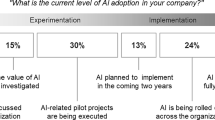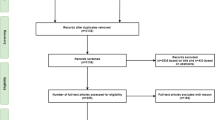Abstract
Despite the claim that Artificial Intelligence (AI) can revolutionize the way private and public organizations do business, to date organizations still face a number of obstacles in leveraging such technologies and realizing performance gains. Past studies in other novel information technologies argue that organizations must develop a capability of effectively orchestrating and deploying necessary complementary resources. We contend that if organizations aim to realize any substantial performance gains from their AI investments, they must develop and promote an AI Capability. This paper theoretically develops the concept of an AI capability and presents the main dimensions that comprise it. To do so, we ground this concept in the resource-based view of the firm and by surveying the latest literature on AI, we identify the constituent components that jointly comprise it.
Access this chapter
Tax calculation will be finalised at checkout
Purchases are for personal use only
Similar content being viewed by others
References
Davenport, T.H., Ronanki, R.: Artificial intelligence for the real world. Harv. Bus. Rev. 96, 108–116 (2018)
Brynjolfsson, E., Rock, D., Syverson, C.: Artificial intelligence and the modern productivity paradox: A clash of expectations and statistics. The economics of artificial intelligence: An agenda. University of Chicago Press (2018)
Jarrahi, M.H.: Artificial intelligence and the future of work human-AI symbiosis in organizational decision making. Bus. Horiz. 61, 577–586 (2018)
Pavlou, P.A., El Sawy, O.A.: From IT leveraging competence to competitive advantage in turbulent environments: the case of new product development. Inf. Syst. Res. 17, 198–227 (2006)
Bharadwaj, A.S.: A resource-based perspective on information technology capability and firm performance: an empirical investigation. MIS Q. 169–196 (2000)
Mikalef, P., Boura, M., Lekakos, G., Krogstie, J.: Big data analytics capabilities and innovation: the mediating role of dynamic capabilities and moderating effect of the environment. Br. J. Manag. 30, 272–298 (2019)
Mikalef, P., Boura, M., Lekakos, G., Krogstie, J.: Big data analytics and firm performance: findings from a mixed-method approach. J. Bus. Res. 98, 261–276 (2019)
Gupta, M., George, J.F.: Toward the development of a big data analytics capability. Inf. Manag. 53, 1049–1064 (2016)
Mikalef, P., Boura, M., Lekakos, G., Krogstie, J.: Big data analytics capabilities and innovation: the mediating role of dynamic capabilities and moderating effect of the environment. Br. J. Manag. (2019, in press)
Mikalef, P., Krogstie, J., Pappas, I.O., Pavlou, P.: Exploring the relationship between big data analytics capability and competitive performance: the mediating roles of dynamic and operational capabilities. Inf. Manag. (2019)
Mikalef, P., Pappas, I.O., Krogstie, J., Giannakos, M.: Big data analytics capabilities: a systematic literature review and research agenda. Inf. Syst. e-Bus. Manag. 16, 1–32 (2018)
Wade, M., Hulland, J.: The resource-based view and information systems research: review, extension, and suggestions for future research. MIS Q. 28, 107–142 (2004)
Barney, J.B.: Resource-based theories of competitive advantage: a ten-year retrospective on the resource-based view. J. Manag. 27, 643–650 (2001)
Lockett, A., Thompson, S., Morgenstern, U.: The development of the resource-based view of the firm: a critical appraisal. Int. J. Manag. Rev. 11, 9–28 (2009)
Palmatier, R.W., Dant, R.P., Grewal, D.: A comparative longitudinal analysis of theoretical perspectives of interorganizational relationship performance. J. Mark. 71, 172–194 (2007)
Sirmon, D.G., Hitt, M.A., Ireland, R.D., Gilbert, B.A.: Resource orchestration to create competitive advantage: breadth, depth, and life cycle effects. J. Manag. 37, 1390–1412 (2011)
Melville, N., Kraemer, K., Gurbaxani, V.: Information technology and organizational performance: an integrative model of IT business value. MIS Q. 28, 283–322 (2004)
Grant, R.M.: The resource-based theory of competitive advantage: implications for strategy formulation. Calif. Manag. Rev. 33, 114–135 (1991)
Varian, H.: Artificial intelligence, economics, and industrial organization. National Bureau of Economic Research (2018)
Maddox, T.M., Rumsfeld, J.S., Payne, P.R.J.J.: Questions for artificial intelligence in health care. JAMA 321, 31–32 (2019)
Mikalef, P., Framnes, V.A., Danielsen, F., Krogstie, J., Olsen, D.H.: Big data analytics capability: antecedents and business value. In: Pacific Asia Conference on Information Systems (2017)
Mikalef, P., Pappas, I.O., Krogstie, J., Giannakos, M.: Big data analytics capabilities: a systematic literature review and research agenda. Inf. Syst. e-Bus. Manag. 1–32 (2017)
Ransbotham, S., Gerbert, P., Reeves, M., Kiron, D., Spira, M.: Artificial intelligence in business gets real. MIT Sloan Manag. Rev. (2018)
Balaraman, V., Brown, S., Duggirala, M., Moore, S., Nie, J.-Y.: Complexity sciences and artificial intelligence for improving lives through convergent innovation. In: Academy of Management Proceedings, pp. 17958. Academy of Management Briarcliff Manor, NY (2018)
Li, B.-H., Hou, B.-C., Yu, W.-T., Lu, X.-B., Yang, C.-W.: Applications of artificial intelligence in intelligent manufacturing: a review. Front. Inf. Technol. Electron. Eng. 18, 86–96 (2017)
Lemley, J., Bazrafkan, S., Corcoran, P.: Deep learning for consumer devices and services: pushing the limits for machine learning, artificial intelligence, and computer vision. IEEE Consum. Electron. Mag. 6, 48–56 (2017)
Sousa, M.J., Rocha, Á.: Skills for disruptive digital business. J. Bus. Res. 94, 257–263 (2019)
Wilson, H.J., Daugherty, P., Bianzino, N.: The jobs that artificial intelligence will create. MIT Sloan Manag. Rev. 58, 14 (2017)
Bloomfield, B.P.: The culture of artificial intelligence. In: The Question of Artificial Intelligence, pp. 59–105. Routledge (2018)
Brynjolfsson, E., Mcafee, A.: The business of artificial intelligence. Harv. Bus. Rev. (2017)
Zheng, N.-N., Liu, Z.-Y., et al.: Hybrid-augmented intelligence: collaboration and cognition. Front. Inf. Technol. Electron. Eng. 18, 153–179 (2017)
Shortliffe, E.H., Sepúlveda, M.J.: Clinical decision support in the era of artificial intelligence. Jama 320, 2199–2200 (2018)
Sterne, J.: Artificial Intelligence for Marketing: Practical Applications. John Wiley & Sons (2017)
Heer, J.: Agency plus automation: Designing artificial intelligence into interactive systems. Proc. Nat. Acad. Sci. 116, 1844–1850 (2019)
Mikalef, P., Pateli, A.: Information technology-enabled dynamic capabilities and their indirect effect on competitive performance: findings from PLS-SEM and fsQCA. J. Bus. Res. 70, 1–16 (2017)
Mikalef, P., Van de Wetering, R., Krogstie, J.: Big data enabled organizational transformation: the effect of inertia in adoption and diffusion. In: Business Information Systems (BIS) (2018)
Author information
Authors and Affiliations
Corresponding author
Editor information
Editors and Affiliations
Rights and permissions
Copyright information
© 2019 Springer Nature Switzerland AG
About this paper
Cite this paper
Mikalef, P., Fjørtoft, S.O., Torvatn, H.Y. (2019). Develo** an Artificial Intelligence Capability: A Theoretical Framework for Business Value. In: Abramowicz, W., Corchuelo, R. (eds) Business Information Systems Workshops. BIS 2019. Lecture Notes in Business Information Processing, vol 373. Springer, Cham. https://doi.org/10.1007/978-3-030-36691-9_34
Download citation
DOI: https://doi.org/10.1007/978-3-030-36691-9_34
Published:
Publisher Name: Springer, Cham
Print ISBN: 978-3-030-36690-2
Online ISBN: 978-3-030-36691-9
eBook Packages: Computer ScienceComputer Science (R0)




